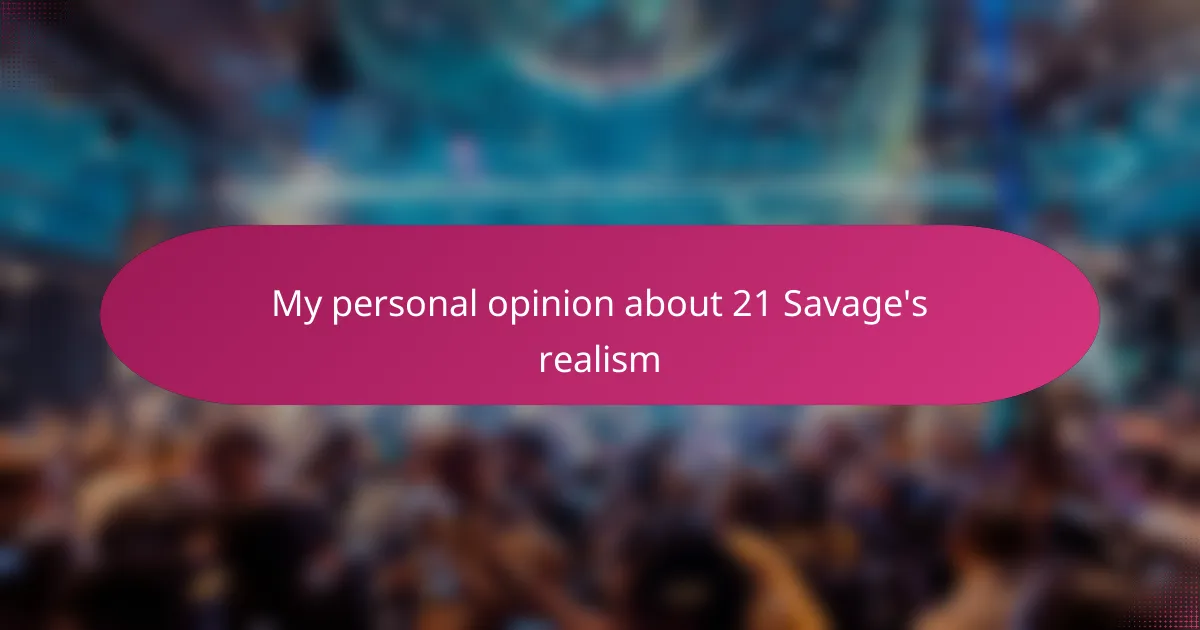Key takeaways
- Realism in rap music focuses on authentic storytelling that reflects personal and societal truths, creating strong connections between the artist and listeners.
- 21 Savage’s minimalist delivery emphasizes raw honesty, capturing the complexities of life without embellishment, making his narratives relatable and impactful.
- Authenticity in lyrics comes from genuine experiences and emotions, allowing listeners to reflect on their own struggles and fostering a deeper connection with the music.
- The power of simplicity in storytelling challenges conventional rap expectations, proving that profound emotions can be conveyed without complex wordplay or flashy techniques.
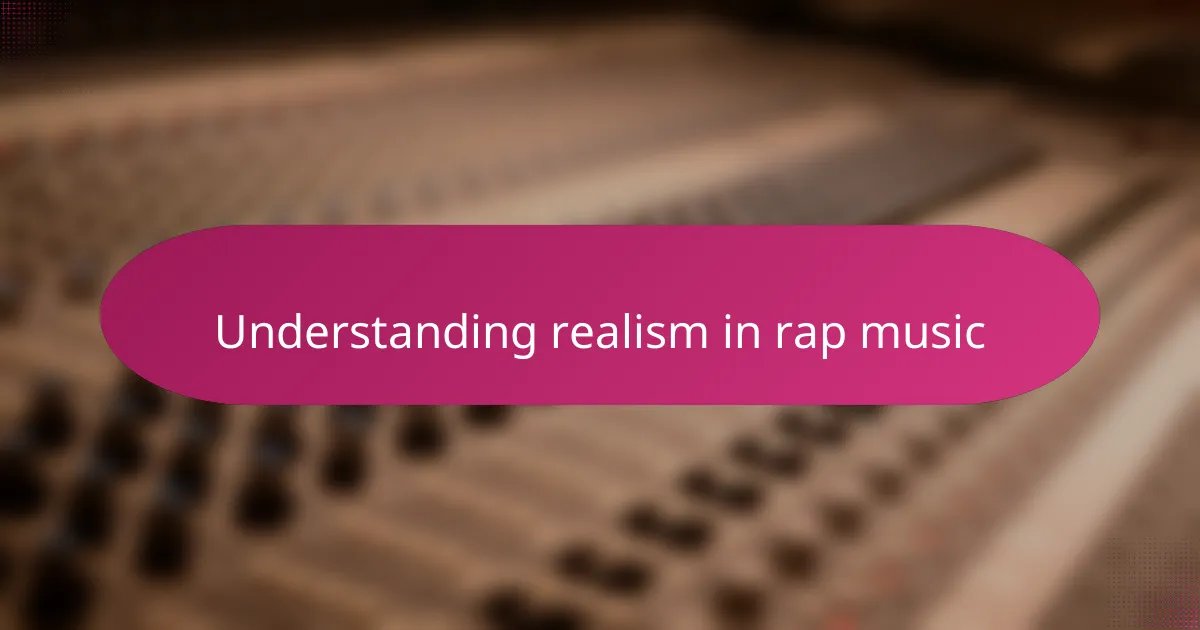
Understanding realism in rap music
Realism in rap music isn’t just about telling stories—it’s about sharing truths that hit close to home. When I first listened to tracks that painted vivid pictures of street life and personal struggles, I realized how powerful raw, unfiltered storytelling can be. Have you ever felt like a song spoke directly to your own experiences? That’s the kind of connection realism creates.
To me, realism serves as a bridge between the artist and the listener, breaking down barriers with honesty. It’s not just about grim realities but also the emotions behind them—fear, hope, desperation, and resilience. When a rapper lays it all bare, I find myself reflecting on life’s harsh realities in a way no news report ever could.
Why do some songs feel more authentic than others? I believe it’s the artist’s lived experience shining through every line. The moments when the lyrics make you pause and think—“This isn’t just music; it’s someone’s life”—that’s realism at its core, and it’s what gives rap its undeniable power.
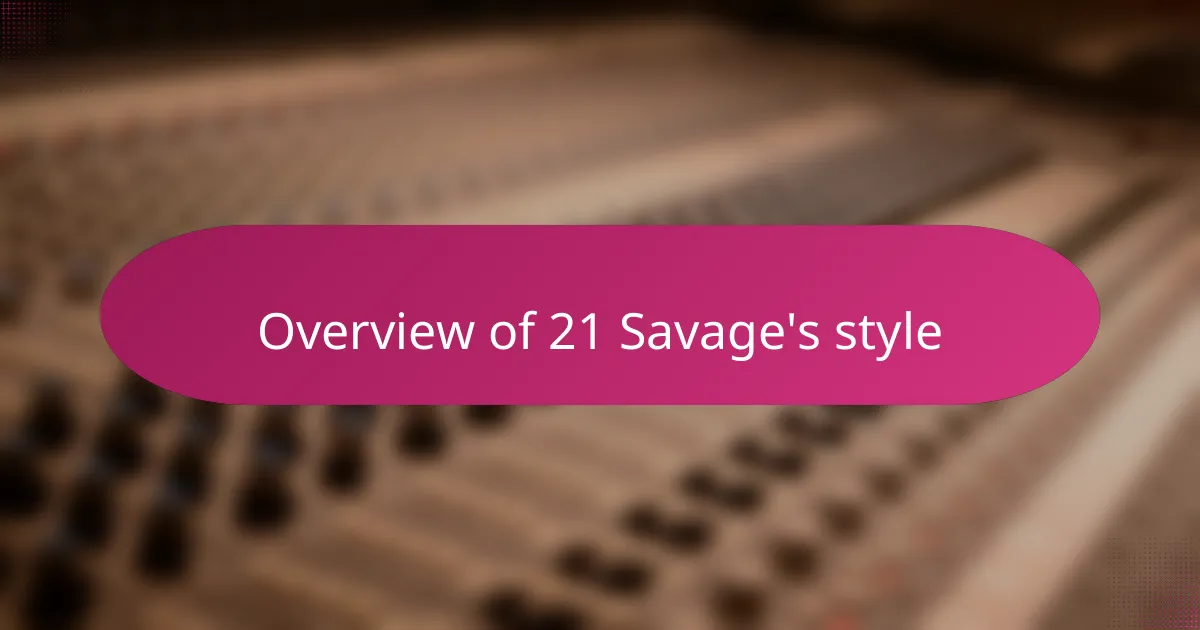
Overview of 21 Savage’s style
When I listen to 21 Savage, what strikes me first is his straightforward and unembellished delivery. His style isn’t flashy or overly complex—it’s minimalistic but razor-sharp, which makes every word hit harder. Have you noticed how he uses pauses and tone to create tension, making you hang on to each line as if it’s a direct confession?
What I appreciate most about his approach is how he blends cold, streetwise narratives with a surprisingly vulnerable undercurrent. It’s like he’s telling you tough truths while letting you glimpse the man behind the image. From my experience, that balance is what sets his storytelling apart—it feels real because it’s not just bravado; it’s a lived reality.
In my opinion, 21 Savage’s style is a perfect example of how simplicity can amplify authenticity. He doesn’t need flashy metaphors or complicated rhyme schemes to be effective. Instead, he opts for raw honesty, delivering his verses almost like a diary entry you’re not supposed to read but somehow can’t look away from. Don’t you think that kind of candidness is what keeps listeners coming back?
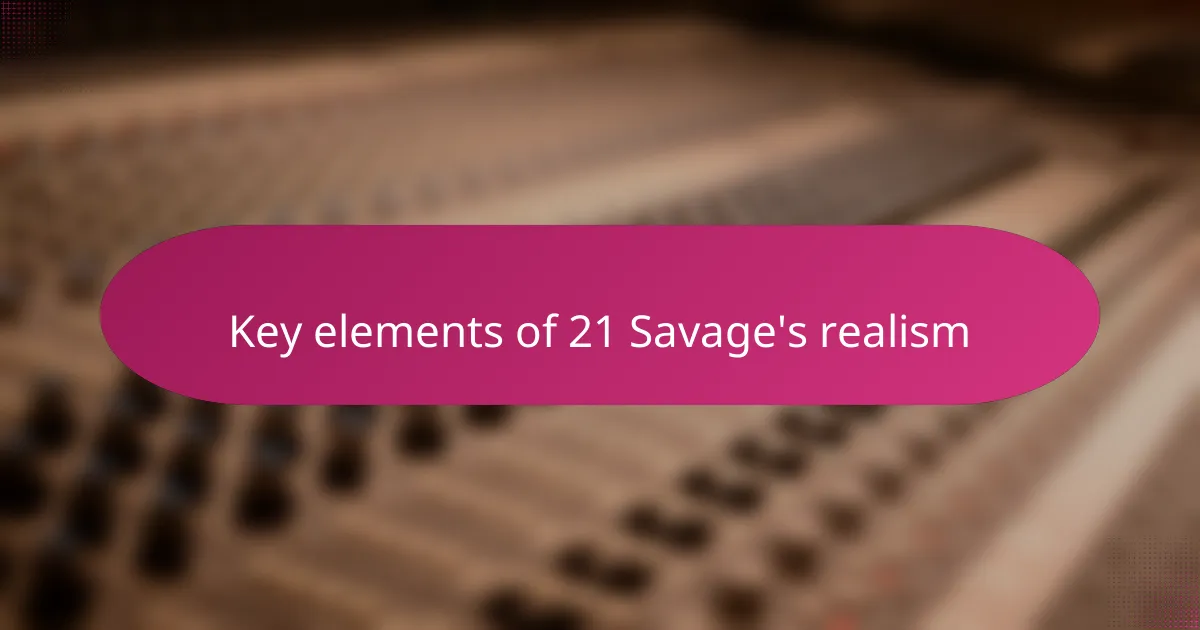
Key elements of 21 Savage’s realism
One thing I notice about 21 Savage’s realism is how he doesn’t sugarcoat the harshness of life. His lyrics feel like snapshots of moments that are raw and unvarnished, almost as if he’s inviting you into his world without any filter. Have you ever caught yourself replaying a line because it struck you as painfully true? That’s the kind of stark honesty he brings to his music.
Another key element is his ability to balance bleak narratives with emotional depth. It’s not just about the violence or struggle; it’s also about the loneliness and inner conflict that often come with those experiences. From what I’ve seen, this makes his realism more relatable because it captures not just actions but the feelings behind them.
I also think his minimalist delivery plays a huge role here. By keeping the beats and flows stripped down, 21 lets the words do the heavy lifting. It’s like he trusts his story so much that he doesn’t need to dress it up. For me, that kind of confidence in one’s authenticity is rare and what makes his brand of realism so compelling.
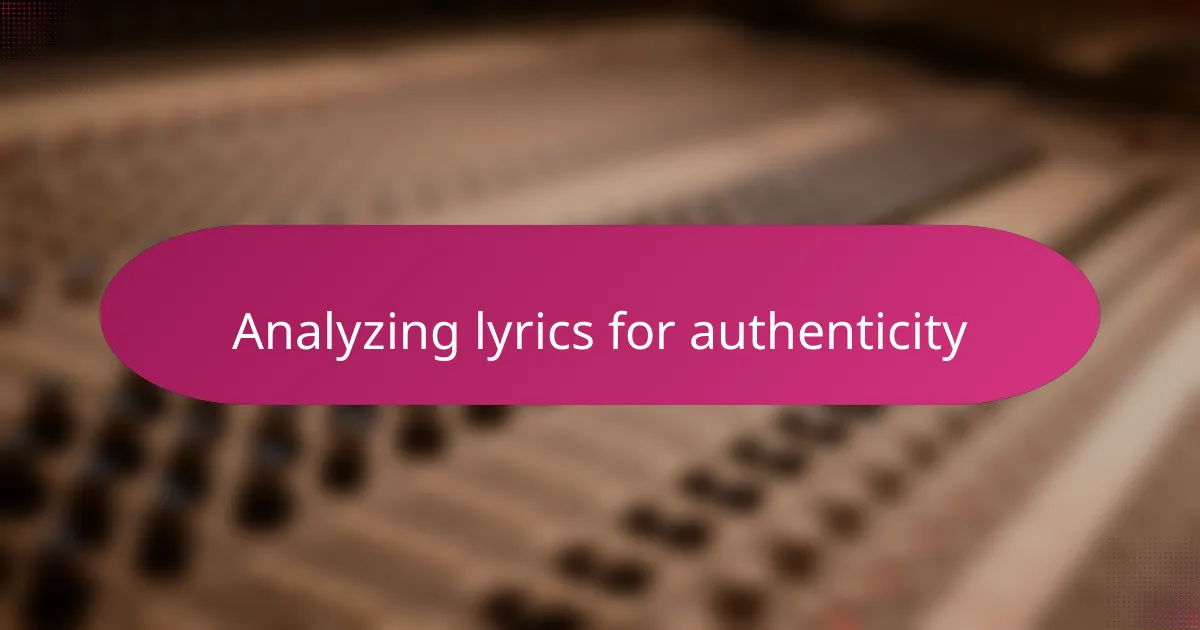
Analyzing lyrics for authenticity
When I dive into 21 Savage’s lyrics, I’m constantly asking myself: does this feel genuine? For me, authenticity in rap comes from those subtle details—small moments and emotions that don’t seem crafted for an audience but rather spilled from real life. I remember hearing a verse where the pain and frustration felt almost tangible, making me wonder about the experiences behind those words.
I’ve noticed that analyzing lyrics for authenticity means paying attention not just to what’s said, but how it’s said. 21’s cold, deliberate delivery often hides layers of vulnerability, which I find fascinating. Have you ever caught yourself leaning in closer because you sense there’s more beneath the surface? That’s exactly the kind of lyricism that reveals the artist’s true self beyond the persona.
Sometimes, I reflect on my own experiences while listening, which deepens my connection to the lyrics. When 21 Savage raps about survival and hardship, it’s not just storytelling to me—it feels like a mirror reflecting real struggles. It makes me appreciate the courage it takes to be that open, especially in a genre where toughness often overshadows truth.
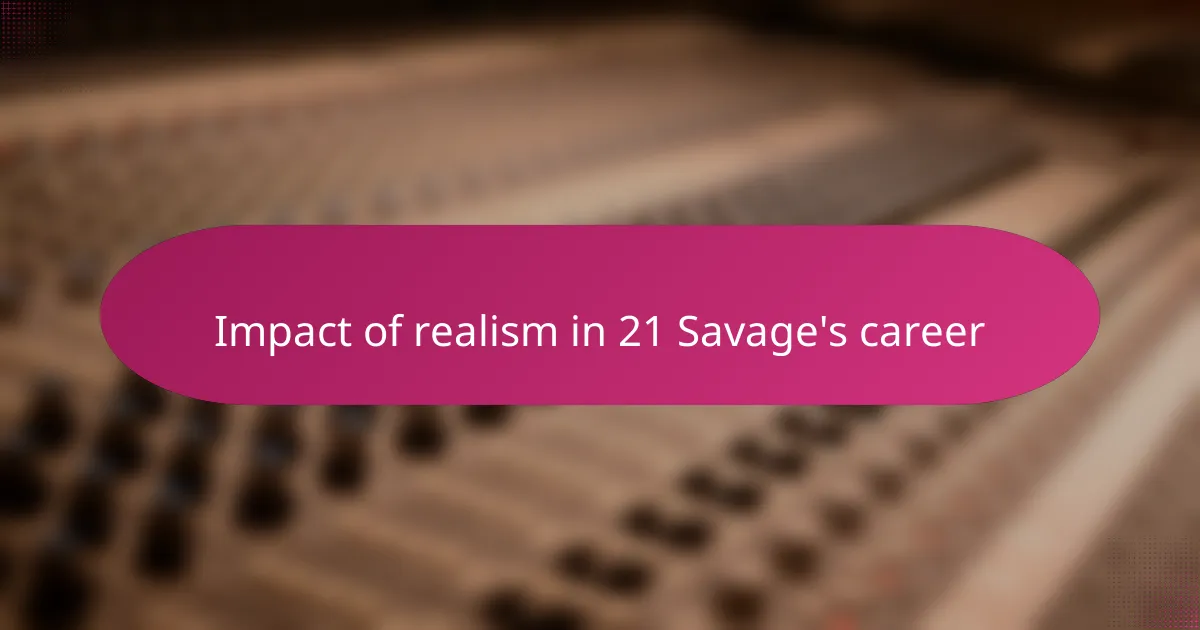
Impact of realism in 21 Savage’s career
The impact of realism on 21 Savage’s career is something I find truly profound. His unfiltered storytelling doesn’t just shape his music—it shapes how audiences perceive him, turning him from just another rapper into a genuine voice of the streets. I remember the first time I heard “No Heart”; the rawness and realness hit me so deeply that I couldn’t help but respect the vulnerability beneath that tough exterior.
What fascinates me is how his realism has opened doors beyond music, giving him credibility in conversations about social issues and street realities. It’s like his authenticity created a platform where he’s not only an artist but also a storyteller and a witness to harsh truths. Have you noticed how his honest narratives resonate with both mainstream listeners and those who share similar struggles? That dual impact is rare and speaks to the power of being unapologetically real.
I also think 21 Savage’s career trajectory shows how realism builds lasting connections with fans. It’s not just the hits or the catchy hooks—it’s the feeling that he’s speaking from experience, not just imagination. From what I’ve seen, that trust in his voice creates a loyal audience that values substance over style. And honestly, in today’s rap scene, that kind of authenticity is a refreshing rarity.
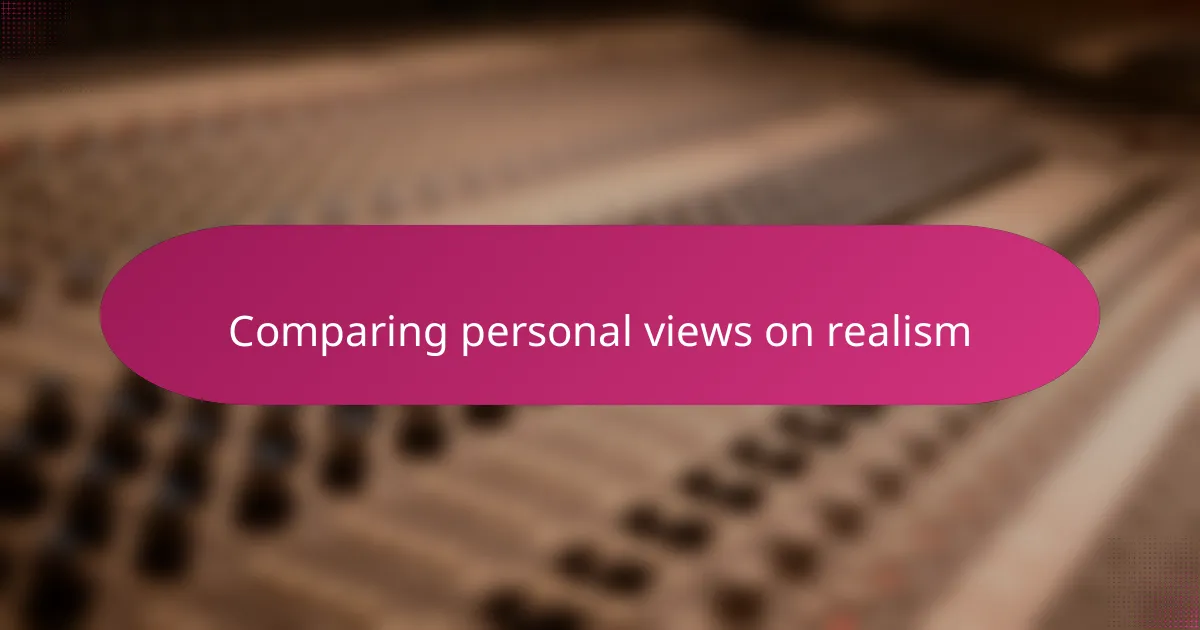
Comparing personal views on realism
When I compare my views on realism in rap with how others perceive it, I often wonder why some people expect more flourish or poetic embellishment. For me, realism thrives in simplicity and rawness—it’s the stark truth laid bare without dressing it up. Don’t you find that when an artist like 21 Savage keeps it straightforward, it feels more like listening to a friend than a performer?
I recall conversations with fellow rap enthusiasts where opinions diverged sharply: some praised complex lyricism as the ultimate proof of authenticity, while others, like myself, felt that true realism doesn’t need layers of wordplay to resonate. This contrast made me realize that realism in rap is deeply personal, shaped by what each listener values—whether it’s emotional honesty or lyrical dexterity.
Reflecting on these different viewpoints also made me appreciate 21 Savage’s unique place in this spectrum. He doesn’t complicate his storytelling but still manages to convey profound emotions through his minimalist approach. To me, that balance challenges the notion that realism must be elaborate to be genuine, proving that sometimes less really is more.
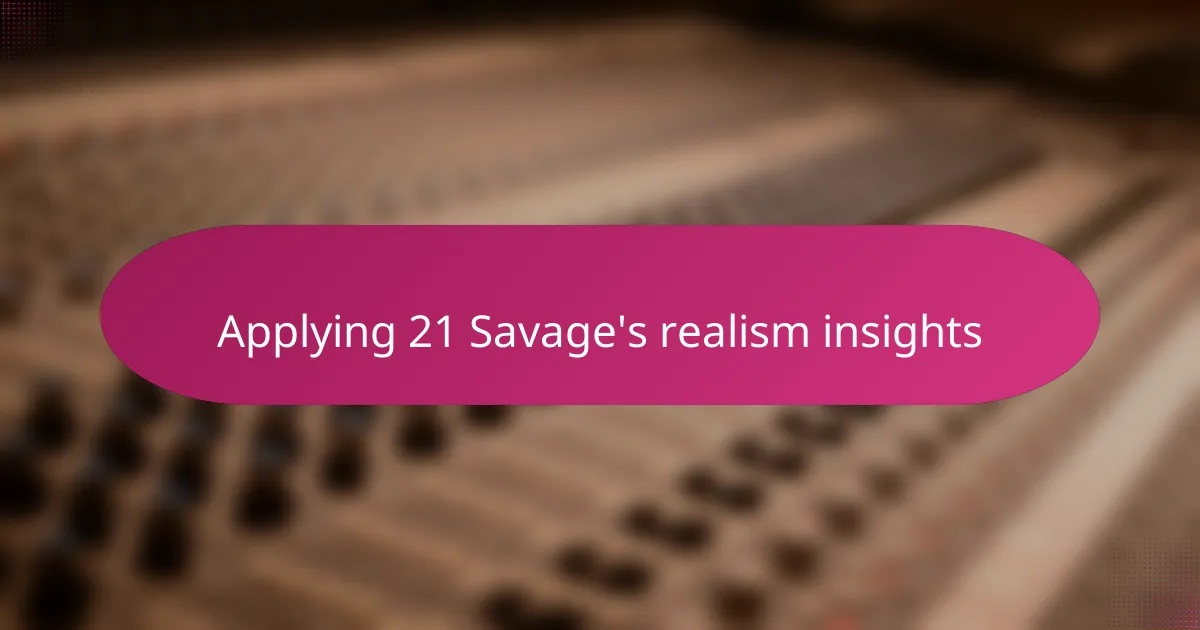
Applying 21 Savage’s realism insights
Applying 21 Savage’s realism insights means embracing honesty without any frills. I’ve found that when I try to channel that same straightforwardness in my own storytelling, it forces me to confront truths I might otherwise avoid. Isn’t it refreshing how his bluntness invites us to face life’s raw moments head-on, without sugarcoating?
What I also take away from his realism is the power of subtlety—how the pauses, the tone, and the space between lines carry as much weight as the words themselves. From my experience, applying this can deepen the emotional impact, making the story linger longer in the listener’s mind. Have you ever noticed how sometimes what’s left unsaid says even more?
Finally, using 21’s approach shows me that authenticity doesn’t rely on complexity or grandiosity. It’s about trusting your own truth enough to share it plainly, and that trust resonates deeply. When I try this, I see how listeners connect with genuine vulnerability rather than performance, which in my opinion, is the true essence of realism in rap.
